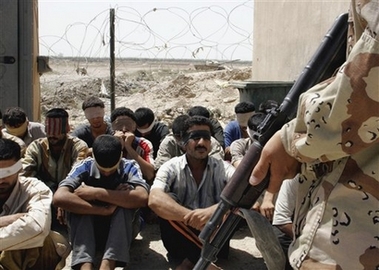US and Iraqi forces move on insurgents
(AP)Updated: 2007-06-19 08:32
BAGHDAD - US and Iraqi forces launched attacks on the capital's northern and southern flanks to clear out Sunni insurgents, al-Qaida fighters and Shiite militiamen who were chased from the capital and Anbar province during the first four months of the Baghdad security operation, military officials said Monday.
 Iraqi soldier guards arrested suspected al-Qaida members in Baqouba, 60 kilometers (35 miles) northeast of Baghdad, Iraq, Monday, June 18, 2007. [AP]  |
"We are going into the areas that have been sanctuaries of al-Qaida and other extremists to take them on and weed them out, to help get the areas clear and to really take on al-Qaida," the senior official said on condition of anonymity because he was not authorized to speak about the operation. "Those are areas in the belts around Baghdad, some parts in Anbar province and specifically Diyala province."
Al-Qaida has proved an extremely agile foe for US and Iraqi forces, as shown by its ability to transfer major operations to Baqouba from Anbar province, the sprawling desert region in western Iraq. There was no guarantee driving the organization out of current sanctuaries would prevent it from migrating to other regions to continue the fight.
The death toll in sectarian violence Monday skyrocketed after a brief period of relative peace. At least 110 people were killed or found dead Monday, with 33 tortured bodies showing up in Baghdad alone.
The US military also announced a soldier was killed by a roadside bomb while on a foot patrol the day before in southern Baghdad. The death raised to at least 3,527 members of the US military who have died since the Iraq war started in March 2003, according to an Associated Press count.
Well to the south, Iraqi officials reported as many as 36 people were killed in fierce overnight fighting that began as British and Iraqi forces conducted house-to-house searches in Amarah, a stronghold of the Shiite Mahdi Army militia.
The US military issued a statement that said at least 20 people were killed in clashes with coalition forces, without disclosing their nationality. A spokeswoman for Britain's Ministry of Defense said that the British soldiers played a supporting role to Iraqi security forces during the raid and fighting. She spoke on condition of anonymity, which is ministry policy.
The operations on Baghdad's flanks were opened by the US 3rd Infantry Division, which has taken over dangerous al-Qaida-infested regions to the south. The division began its drive into the Salman Pak and Arab Jabour districts on the city's southeastern fringe over the weekend.
At the time ground forces commander Lt. Gen. Raymond Odierno said US troops were heading into those areas in force for the first time in three years.
The military said in a statement Monday fighter jets dropped "four precision-guided bombs" in support of 1,200 US soldiers from the 3rd Infantry as they started moving on al-Qaida targets.
Military officials said Multi-National Division-North forces likewise were increasing pressure on al-Qaida sanctuaries in the verdant orange and palm groves of Diyala province and its capital Baqouba, now one of the most fiercely contested regions in Iraq.
The province is a tangle of Shiite and Sunni villages that has played into the hands of al-Qaida and allied militants who have melted into the tense region and sought to inflame existing sectarian troubles.
Al-Qaida has conducted public executions in the Baqouba main square and otherwise sought to enforce extreme Taliban-style Islamic code. The terror organization's actions in the province have caused some Sunni militants, al-Qaida's natural allies, to turn their guns on the group, with American assistance and blessing. Some militant Shiites are likewise joining government forces in a bid to oust the foreign fighters and Muslim extremists.
Multi-National Division-Baghdad, which has run the security operation in the capital since it began on Feb. 14, has increased pressure on districts to the northwest of the city to cut supply and reinforcement lines from Ramadi, the capital of Anbar province in western Iraq, to the Baqouba region.
"We're focusing up in the northwest to apply force in an area that's been important to al-Qaida and its associates as they move between Ramadi and Baqouba. That work together with the developing efforts to provide local security through the (Sunni) tribes in Abu Ghraib and Amariyah is putting pressure on al-Qaida," said Lt. Col. Scott Bleichwehl, division spokesman.
The US military said its Baghdad force had uncovered six Iranian-made rockets Sunday in a school yard that was suspected of being a launching site against the heavily fortified Green Zone in the capital.
Some Sunni tribes, who had fought with or offered
sanctuary to al-Qaida in Anbar province, have risen up against the group and are
now receiving arms and training from US forces. American military officials are
trying to spread that success to al-Qaida areas now under attack.
| 1 | 2 |  |
|
||
|
||
|
|